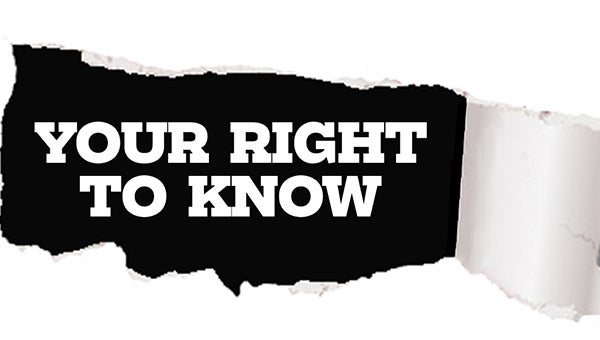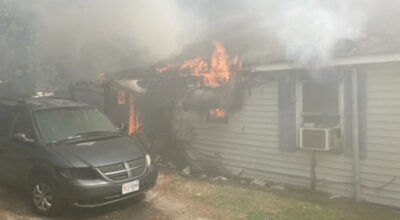Open records? Sometimes
Published 12:01 am Sunday, November 29, 2015
By Dave Ress
Special to the News-Herald
State law says some government records must be disclosed, but that’s not the way many Virginia officials see things.
A statewide test by 13 newspapers to see what happens when Virginians ask about information state law says officials must disclose shows the state’s four-decades-old Freedom of Information Act is widely disregarded.
More than half of the more than three dozen police or sheriff’s departments included in the test refused to release any information about felony incidents, even though the act says those are “records required to be released.”
About one-quarter of local government and school board offices refused to release information about the salaries and allowances of city managers, county administrators and high school principals — in Radford, school officials took five days and charged $12 to look up and provide the salary of the city’s one high school principal.
“This is what we’ve been hearing anecdotally, an uneven and inadequate response, not just here and there … it’s a systematic problem,” said Del. James M. LeMunyon, R-Fairfax, chairman of the state Freedom of Information Advisory Council.
Virginia’s law gives officials plenty of loopholes — 170 excuses to decline to release a record or let people listen to their discussions.
But it also says that some records must be released, and that those excuses for withholding access are not mandatory except in the case of protecting confidential informants in criminal matters.
“The law is clear that this information has to be released,” said Andrew Bodoh, a Richmond attorney specializing in FOIA law.
“The issue, then, is either ignorance or apathy,” he said. “The law already requires employees, officials and officers of public bodies to be familiar with FOIA, but we can see that has limited effect.”
For nearly half a century, Virginia law has said officials should let the public see, and copy, public records, and should let the people observe elected officials as they debate and decide the laws we must follow, the taxes we must pay, how our kids will be taught and what our neighborhoods will be like.
Even before that, the Virginia Supreme Court was one of the first state supreme courts to rule that citizens have a right to see and copy government records. That ruling came in an 1891 case that involved Warwick County Clerk Henry DeB. Clay’s request to copy voter records of the registrar of elections for Newport News, then part of the county. Clay, a Union Army veteran, was preparing for an election in which his opponents sought to disenfranchise his African-American supporters.
FOIA “is one of the primary tools we have to ensure government is open and accountable to the people it serves” said Bill Farrar, director of public policy and communications for the American Civil Liberties Union of Virginia.
The ACLU has had some bad experiences of its own with FOIA in Virginia. Trying to study law enforcement agencies’ policies on body cameras, it sent formal requests for copies to more than 360 agencies and offices.
Only 59 replied, and some of those said they had no policies, and so no records to provide.
The problem is, under Virginia’s law, officials must say they have no records, if that is the case, said Farrar, who has worked for two decades in Virginia as a newspaper reporter, government public information officer and professor of mass communications.
In fact, there are only five legal replies:
One, to provide the records.
Two, to say the official chose to withhold the record because it was covered by one of the act’s 170 exemptions.
Three, to say some of the record will be withheld, again by choosing to apply one of the exemptions, but to release the rest.
Four, to say there is no record or that it cannot be found (if the official knows another official has the record, he or she must disclose that).
Five, to request more time to look.
“If the ACLU only got 59 replies, you have to wonder what happens if an ordinary citizen asks,” Farrar said.
In reviewing the results of the newspapers’ statewide FOIA test, Farrar said he was particularly concerned by reporters’ descriptions of the officials’ responses — particularly what he called the hostility and lack of knowledge of the requirements of the law.
“So many asking, ‘Why do you want this?’ … When you ask that, people tend to think they aren’t entitled to ask,” he said. “All too often that is a shutdown.”
In testing compliance with FOIA, the newspapers this year sent staff members who did not cover the locality or the department, to make sure requesters weren’t getting special treatment.
But requesters were often asked their affiliation — and even when they weren’t, some officials apparently did quick online searches to check.
That’s how a Roanoke Times reporter learned what Roanoke County principals are paid, after being told that salary information could only be released to employees.
In Richmond, when asked for a copy of the chief administrative officer’s contract in order to see that official’s pay and allowances, a clerk in the personnel office checked with a superior, then said, “We don’t give that out.”
“To make sure I understood correctly, I reiterated that the document is public, but they were refusing to give it out. She said I understood her correctly,” reporter Ted Strong noted.
When a News & Advance reporter stopped by Lynchburg police headquarters to see the incident reports of felonies committed overnight, she was asked why she wanted it, and when she said she did not have to say why, the officer said the reports were not public.
The reporter, who perhaps unlike most Virginians knew Virginia code says that the record is required to be released, told the officer the information was public.
“Well to some extent they are,” the officer replied. He told her to file a written request, which is not required by the law.
The reporter eventually was told it would cost $10 to generate a call sheet.
FOIA says public bodies may make reasonable charges, not to exceed the actual cost of searching for, copying and supplying the requested records. It is against the law to pad such charges to cover any other government costs.
“Regarding costs, FOIA is woefully inadequate in how it addresses estimates and cost assessments,” attorney Bodoh said.
The newspapers’ survey found many officials insist on a written request for records, even though the law does not require one.
Roanoke city police, after turning down an oral request, refused to accept a written request for felony incident information, saying the reports were not public records.
In Suffolk, an officer said the request had to be reviewed by a lieutenant and, if the requester did not have what the police considered a valid reason for seeing the information, the requester might not get it.
The sample is smaller than a statewide test newspapers conducted in 2007, but the percentage of police departments refusing to release the records was slightly higher.
The 2007 survey, unlike this year’s, did not focus only on records that FOIA specifically says are public.
But it found records were hard to get.
In 2007, when asked for emails, 12 percent of local governments refused access and 46 percent said they didn’t use email. The rest provided them.
This year, the newspapers asked for information that FOIA says must be provided. In many localities, and for the case of the governor, cabinet secretaries, and the General Assembly, email and other correspondence is exempt from mandatory release.
In 2007, asked for fire inspection reports for schools, 13 percent refused, while 35 percent wouldn’t supply them because they sent those records to the state Department of Education. In a Daily Press test earlier this year, all school divisions on the Peninsula, Middle Peninsula and Isle of Wight County provided copies of their latest school safety audit reports.
Ginger Stanley, executive director of the Virginia Press Association, said she was disappointed that 18 out of 36 law enforcement agencies refused to produce incident report information. She said she was surprised and concerned by the refusal of nearly three in 10 school systems to release information about principals’ salaries.
“These audit numbers suggest that much education still remains to be done to protect the citizens’ right to know what their government is doing on their behalf,” Stanley said.
FOIA actually says there is no legal justification to deny access to contracts between a public body and its officers or employees, except for some settlements of employment disputes, or of any records of the position, job classification, official salary or hourly wage, or any records of the allowances or reimbursements for expenses paid to public employee. It’s there in Virginia Code section 2.2-3705.8 (A).
The keystone of Virginia’s ethics law for officials, meanwhile, is disclosure of their business interests, gifts and donations to their political campaigns. While the General Assembly this year cracked down on the gifts politicians may receive, Virginia has some of the loosest laws in the nation about conflicts of interest and campaign finance.
But when asked to see the basic financial disclosure reports filed by the Spotsylvania County Board of Supervisors chairman and county administrator, the county clerk’s staff said the request would have to be considered in case the cost was excessive.
The staff said they do not take written requests.
The state Freedom of Information Advisory Council is conducting a three-year review of FOIA, with the goal of recommending revisions for the 2017 General Assembly session.
It has been concentrating on the many exemptions in the law that give public officials the discretion — but not the obligation — to withhold some records or to meet behind closed doors for some purposes. So far, its working groups have recommended retaining virtually all the exemptions they’ve considered.
The council is heavily lobbied by government agencies and local government associations, and its working groups tend to say cases of flouting the law are exceptions best addressed by education.
That view is not shared by advocates for open government.
“There is a compliance problem in Virginia’s localities, schools and state agencies,” said Megan Rhyne, executive director of the Virginia Coalition for Open Government.
“Sometimes the problem is in people not being properly familiar with the law,” she said. “Other times the problem is a view of FOIA as a nuisance or an afterthought, something that gets in the way of the real work of government.”
But in all cases, there’s one thing public officials need to remember about any Virginian’s request for public records, Rhyne said.
“The one thing they have in common is a citizenry that wants to be kept informed and wants to be able to access records they deem important to them.”
To see the full set of results from the FOIA project, visit https://datawrapper.dwcdn.net/B76sO/1/.







